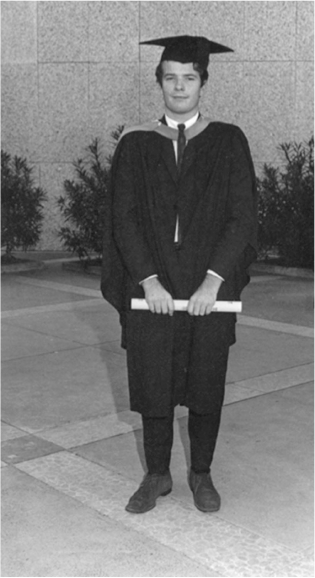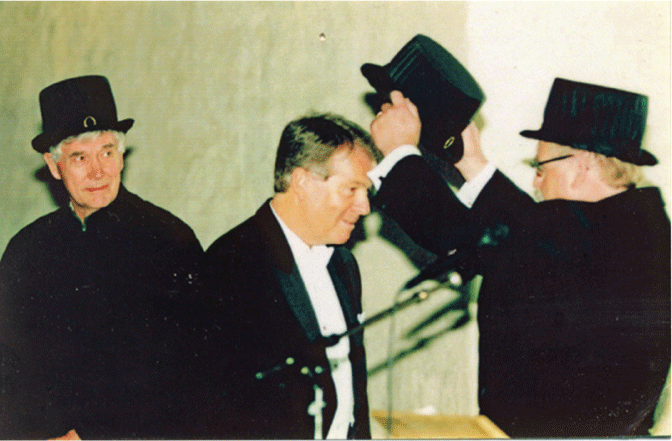Professor Paul Alewood
Edouard C. Nice A and John D. Wade B CA Clinical Biomarker Discovery and Validation, Department of Biochemistry and Molecular Biology, Monash University, Clayton, Vic. 3800, Australia.
B Florey Institute of Neuroscience and Mental Health, University of Melbourne, Melbourne, Vic. 3010, Australia.
C Corresponding author. Email: john.wade@florey.edu.au

Edouard C. Nice is currently an Adjunct Professor at Monash University where he is Head of Clinical Biomarker Discovery and Validation (Department of Biochemistry and Molecular Biology) and a scientific advisor to the Monash Antibody Technologies Facility (MATF), for which he was director from 2009 to 2013. He also holds a Visiting Professorship at Sichuan University/West China Hospital and an adjunct position at Macquarie University, Sydney, Australia. His long-term research interests have been in protein and peptide micropurification, biomarker discovery and validation, SPR analysis, high throughput monoclonal antibody production and validation, and clinical biomarker assay development, with a strong translational focus on colorectal cancer, especially the development of faecal proteomics for colorectal cancer detection and surveillance. He is a founder member and past chair of the Australian Peptide Association, a founder member of the Protein and Peptide Society of Singapore and was awarded the 2012 Xiaoyu Hu Memorial Award by the Chinese Peptide Society in recognition of his significant achievements in peptide science. He has an active involvement in the Human Proteome Organization (HUPO), having been co-chair and treasurer of the successful HUPO 2010 meeting in Sydney, and is currently co-chair of the Pathology Pillar and the Human Cancer Proteome Project and leader of the HUPO ANZ Chromosome 7 initiative. |

John D. Wade obtained his Ph.D. degree in 1979 at Monash University, Australia, on the structural basis of the diabetogenic action of growth hormones. He received a Nuffield Foundation Fellowship to Cambridge, UK, to undertake post-doctoral studies in the laboratory of Dr R. C. Sheppard at the MRC Laboratory of Molecular Biology on the development of the Fmoc-solid phase peptide synthesis methodology. In 1983, he returned to Melbourne at the invitation of the now Florey Institute of Neuroscience and Mental Health, University of Melbourne, where he heads the Laboratory of Peptide and Protein Chemistry. His interests are in solid phase peptide synthesis of large, complex, functionalized, and often multi-chain peptides. Professor Wade is an NHMRC of Australia Principal Research Fellow and a Fellow of both the Royal Australian Chemical Institute and the Royal Society of Chemistry. |
Australian Journal of Chemistry 73(4) 253-256 https://doi.org/10.1071/CHv73n4_FO
Published: 15 April 2020
We are delighted to introduce this Special Issue of the Australian Journal of Chemistry to mark the retirement of Professor Paul Alewood from the University of Queensland (UQ) on 31 December 2019 after 29 years of service. It comprises 18 manuscripts contributed by highly respected, long-time colleagues and collaborators from seven different countries which address the key subjects of peptide and protein chemistry and biology which have been the foundation of Paul’s research in that time.
After completing his B.Sc. (Honours) at the University of New South Wales (Fig. 1) and his Ph.D. at the University of Calgary (Canada), Paul undertook post-doctoral studies at the Universities of Geneva, London, and Melbourne before taking up a lectureship at the Victorian College of Pharmacy in 1985. He then moved to Bond University, Queensland (Australia’s first private university) where he was a foundation staff member and Assistant Professor of Peptide Chemistry before joining the University of Queensland in 1990 as an Associate Professor, Deputy Director, and Head of Research of the Centre for Drug Design and Development (affectionately known as the 3D Centre) under the directorship of Professor Peter Andrews. The centre merged with the Centre for Molecular and Cellular Biology to form the Institute for Molecular Bioscience (IMB) in 2000. Under the co-directorship of Professor Peter Andrews and Professor John Mattick, Paul took up the position of Chair of the Division of Chemistry and Structural Biology (2000–2009) to help integrate the two entities. As Divisional Head, he was responsible for recruiting many key researchers including Professor Glenn King (structural biology), Professor Matt Cooper (drug development) and Professor Rob Capon (natural products chemistry).

|
Paul has had a major impact on peptide science both nationally and internationally, especially in the fields of peptide, protein, and medicinal chemistry, with a focus on the development of novel chemistries to modulate the structure and function of cysteine-rich bioactive peptides, and the design and synthesis of novel peptide drugs, peptidomimetics, and proteomics. He is the author of over 340 publications in many high quality journals. He is a pioneer in the field of solid phase peptide synthesis where the chemical approach (in situ neutralization) developed by Steve Kent and himself has been adopted by many researchers in both academia and industry (a seminal paper has been cited more than 1300 times) and in venom-based molecular drug discovery (over 100 published papers in the field).
The quality of his research is also evidenced by several scientific awards he has received, including the 2003 Adrien Albert Award, an RACI award that is Australia’s highest honour for medicinal chemistry. He was awarded a Doctor, Honoris Causa at the University of Kalmar, Sweden, in 2001 for his research in conotoxins and support for the education of Swedish students at UQ (Fig. 2). He was made an Honorary Professor at the University of Hainan, China, in 2007 and was a recipient of the Chinese Peptide Society’s Dr Hu Award for Excellence in Peptide Science (2014; Fig. 3) as well as the Murray Goodman Award (American Peptide Society, 2016) for excellence in science and mentoring. In 2015, he was awarded a five-year research fellowship from the National Health and Medical Research Council. He has also been invited to speak at numerous major international conferences in his field.
Throughout his career, Paul has pursued fundamental areas of research that have the potential for translation to novel therapeutic drugs. He was a co-founder of both the successful Melbourne-based peptide company, Auspep, and Xenome, a spin-off biopharmaceutical company from the IMB (co-founded with Professors Richard Lewis and Peter Andrews). Through commercial partners AMRAD and Xenome, conotoxin drugs AM336 and Xen2174 entered the clinic for the treatment of neuropathic pain. He has also interacted with a range of biotechnology and pharmaceutical companies including Glaxo (EGF antagonists), Wellcome (HIV-1 PR inhibitors), Orico (cachexic treatments), Elacor (congestive heart failure drugs), and Mimetica (helix mimetics).
Paul has served on several journal editorial boards including CNS and Neurological Disorders – Drug Targets (2005–9), International Journal of Peptide Research and Therapeutics (2000–current), Journal of Peptide Science (2009–current), and Recent Patents on CNS Drug Discovery (2006–2009). He has reviewed articles for more than 20 different international journals as well as numerous grant applications for the ARC and NHMRC as well as many overseas funding agencies. He has been an active member of many societies with key positions such as Secretary of the Biomolecular Chemistry Division (RACI 1995–2000), Chair of the Venoms to Drugs International Meeting (2000–current), former Chair of the international Chemical Protein Ligation meetings, foundation member (1990) and former co-Chair of the Australian Peptide Society (2015–2019), member of the liaison committee of the International Peptide Society (2012–current), co-Chair of the 4th Solid Phase Peptide Synthesis Symposium in Kyoto 2013, and co-Chair of the Natural Products and Health Symposium held in Singapore in 2013.
Paul has always been passionate about teaching. He has championed early career scientists and has mentored over 30 graduate and post-doctoral researchers during his career, with several of his laboratory alumni now holding senior academic positions around the world (four professors, four associate professors, two senior lecturers and five senior researchers), while others hold senior positions in industry (Amgen, Roche, Novo Nordisk, Novartis, Roche, Alchemia, and Auspep). To date, he has successfully supervised two Honours (two First Class) and 20 Ph.D. students. Post-doctoral trainees from his laboratory have won Marie Curie, ARC, and UQ Fellowships, and hold several NHMRC and ARC project grants. It is therefore most appropriate that the IMB Division of Chemistry and Structural Biology has established the Alewood Prize for the best Early Career presentation at its annual symposia.
As Paul transitions into retirement, we are sure his love of science and intellectual jousting with his colleagues both near and far will remain undiminished. We know that he will continue to interact with his many scientific associates worldwide, attend his favourite scientific meetings (Fig. 4, shown with Special Issue co-Editors, Professors John Wade and Edouard Nice), and mentor his younger colleagues at the IMB for a long time to come. On behalf of his many friends, colleagues, collaborators and students, past and present, we warmly wish Paul all the very best and thank him for his enormous, sustained, and stellar contributions to the peptide chemical biology field over more than three decades.
Conflicts of Interest
The authors declare no conflicts of interest.





